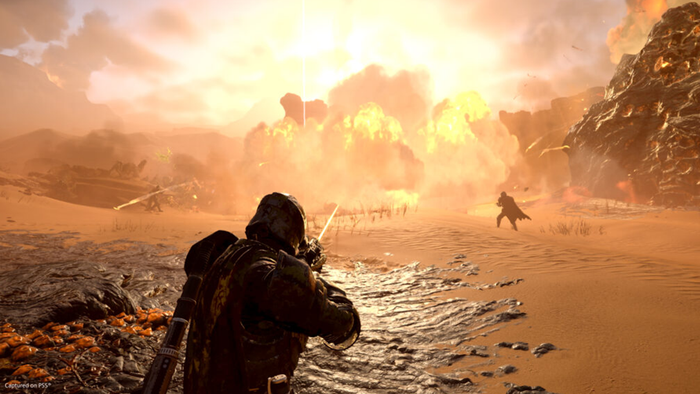
Featured Blog | This community-written post highlights the best of what the game industry has to offer. Read more like it on the Game Developer Blogs.
Jamming your way into the industry
Getting into the games industry is not easy. There's a lot of companies hiring based on personal recommendations. Game jams then become an excellent way to improve your skills, build a game and get the right contacts... all in under 48 hours.

 Team Robocat at Nordic Game Jam 2013
Team Robocat at Nordic Game Jam 2013
One of the questions I get most often is “How do I get into the videogames industry?” I get it from students at universities, games or not, and from professionals who are currently in other fields of work but feel that making games is their passion.
The funny thing is, it hasn’t been that long since I finished my Master’s in Game Design at the IT University of Copenhagen myself, so I most definitely do not have a lot of experience taking videogames into the market.
What I do have however is experience working WITH the industry. In Denmark I am frequently organizing or helping set up all sort of events for the local games community, doing different types of work for indie game companies and games educations.
I am also responsible for all PR communications and the website for IGDA Denmark as one of its board members and as part of that I am one of the core organizers of the Nordic Game Jam.
So when people ask me how to get inside the games industry I always start with the same answer: Go to a game jam.
Sure, I’m organizing the Nordic Game Jam and it’s obviously in my best interest to get passionate people to participate in it. But after being around over 15 localized game jams in Denmark and Sweden I can assure you this is one of the greatest tools for getting inside the games industry.
Unluckily, the reply I get oh-so-frequently is “but I’m not ready to go to a game jam yet!” And why would you? The whole point of the game jam is that you are given a theme right before you start and then you’ve got 48 hours to finish a game based on it. There’s definitely nothing to prepare for.
“But I don’t have the skills for it yet!” is the next common response. And I get this from all sorts of people: artists, programmers, designers, music composers, the so called “idea guys”… It’s funny that I get this even from those who are taking a games-specific education.
Ok, so let’s take for a moment that you truly believe you don’t have the skills to go to a game jam yet. What you could do is go home and use your free time for polishing your skills up a bit. Which is very easy to say, but as we all know, just saying that you want to learn something doesn’t mean you’ll ever get to it, and if you do, who knows if you’re going to be constant enough to keep it up. Because, you see, unless we have a very clear goal that we want to achieve it’s very difficult to keep our motivation and thus continue developing our skills.
This is exactly the purpose of a game jam. It’s that great motivator that will push you to achieving what you need. Sure, you’re not going to learn how to polish your graphics to utmost perfection and you’re most definitely not going to write the most efficient code you could have ever made. 48 hours has its limits to what you can do. But by challenging yourself to make a game within the time limit, you will come up with new ways to do things fast and figure out solutions for your code that will help you out in future projects.
And if you’re clever, you will not do this alone: you will be joining a team.
Because a game jam IS a social event after all. There are more developers participating and it would be pointless if everyone just worked in a closed environment when there is so much potential around you.
A game jam, per definition, is NOT a contest. A game jam is a gathering of developers to create games. If you’re an artist going to a game jam you will most likely join some other people: programmers, designers, music composers, more artists… Your team can be as big or small as you want. And then you will be sharing resources. First time making art for a game? No problem. There’s surely someone around who can take 5 minutes to explain to you how to make a sprite-sheet in a way that your programmer can use. First time programming a game in Unity? I’m sure some team sitting near you has someone willing to give you a rundown of the basics. Got almost everything covered for your game but lacking some nice music? Walk around and look for a music composer who has some time to spare.

NGJ13 keynote speaker Rami Ismail (third from the left) working with some of the participants
As I said before, a game jam is not a competition. The whole point of it is that you will meet other game developers who are pretty much in the same situation as you. No matter how experienced they are, everyone encounters some obstacle to overcome during a game jam. And by harnessing the power of the community surrounding you things will become a lot easier for you to tackle.
What’s even better, by making teams at the jam, rather than just working with your friends, you will get to know new people that you have never worked with before. You never know when you might find someone that later on you will want to start a new project with. It is very likely that you will get to know somebody who has great skills in an area you lack in, someone that, when you are finally ready to create a start-up indie studio you will know that he is a reliable developer who shares the same passion as you. Nothing helps you get to know developers in such a deep way better than working together for 48 hours on a game.
But it’s not all about people you want to work together with. Networking has other sides as well, namely that once people get to know you for what you are capable of doing, you will be far more likely to receive recommendations for job positions. After all the games industry does rely heavily on personal recommendations (as frustrating as that can be when searching for a job position).
And if your main concern is that you will make an awful game that will make you look bad then your worries are completely unfounded. Think about it: all you have spent is a total of 48 hours. If you failed (and let’s face it, it’s very easy to do so) then you have just received a 48-hour lesson in how to avoid that from happening again. Which is why game jams lend themselves so well to developing experimental gameplay projects. So knock yourself out with prototypes for the Oculus Rift, new rendering techniques or some motion controlled gameplay experiment.
My point here is that game jams are an excellent way to introduce yourself to the industry. It’s always difficult to get a company to look at your portfolio. But at a game jam you are directly showing lots of developers what you have to offer.
The game jam I help organize, Nordic Game Jam, is pretty much the biggest one in the world (not to mention it is the game jam that served as inspiration for the creation of the Global Game Jam). Which is why we always have an enormous amount of high-profile developers around, with some of the participants coming from companies such as IO Interactive, Playdead, Press Play, Ubisoft Massive, KnapNok Games and many more from Denmark, Sweden, Finland and other Nordic countries. What’s more, every year we also have keynote speakers of the likes of Peter Molyneux, Manveer Heir, Vlambeer and Dennaton giving feedback to the participants as the game jam progresses. Several of the games that started at Nordic Game Jam have even been released later on for different platforms or have made quite a splash in the media, such as Johann Sebastian Joust or Stalagflight, kickstarting the professional careers of those involved.
Recently I have been talking with the heads of several schools with games studies in Denmark and Sweden. They are all concerned about the same thing: how can they help students find job positions in the games industry? Well, first of all tell students about the local games industry events, talks, gatherings of all sorts. And please, PLEASE help them understand the importance of going to a game jam. Local game jams are available pretty much everywhere these days (just check the Global Game Jam website and find out your nearest jam site) and Nordic Game Jam is great for those near the Scandinavian region.
Because if you’re not here to make games, especially with the wonderful opportunities that game jams provide, then why are you calling yourself a game developer at all?
Read more about:
Featured BlogsAbout the Author(s)
You May Also Like













